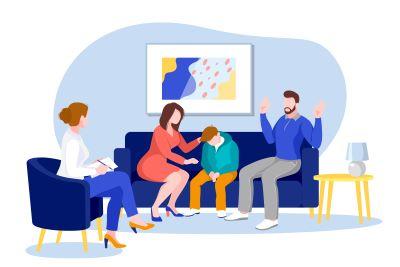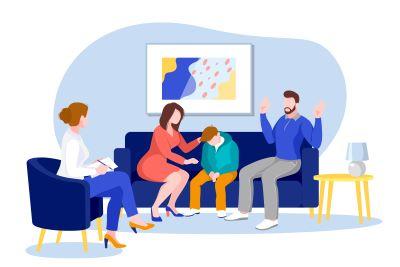Depression Across the Lifespan: Depression—and its Treatments—are Different for Each Life Stage
Depression Across the Lifespan: Depression—and its Treatments—are Different for Each Life Stage

Depression weighs heavily
Someone suffering from depression may feel like they walk through life constantly carrying a backpack full of bricks. Others might feel so depressed that they endlessly peruse the internet with no aim, their eyes fixed onto rapidly scrolling screens. The concept of “depression across the lifespan” means that depression affects people differently depending on their life stage. The Anxiety and Depression Association of America (ADAA) is hosting a professional continuing education Fall Forum on depression across the lifespan on October 21, 2021.
Depression varies by age
The signs of depression can look different for everyone and may vary, especially depending on a person’s age group.
In addition to feeling sad or hopeless, children may exhibit tell-tale signs such as problems at school, avoiding social activities, a loss of interest in fun activities, changes in diet or weight, anxiety, and difficulties with family members. These characteristics are unique to depression in children, while teenagers and adults show different signs.
In teenagers, signs of depression may include those that younger children exhibit. However, uniquely teenage symptoms include mood changes that last longer than a few weeks, problems with friends, unusual levels of irritability and lashing out, feelings of worthlessness, anger and extreme sensitivity, sleeping or eating too much, and self-harm such as cutting and alcohol or drug abuse.
In young adults (age 19-29), signs of depression often relate to the triggers that drive depression. Major life transitions, a lack of support in new environments, relationship issues, and work problems are issues that young adults often face that can trigger the development of depression. The percentage of adults who experienced any symptoms of depression was highest among young adults.
In midlife adults (age 30-69), in addition to the typical signs of depression such as “the presence of feelings of sadness, emptiness, or irritability, accompanied by bodily and cognitive changes lasting at least two weeks,” characteristic signs unique to this age group might include alcohol abuse, anger, and violent behavior.
In older adults (70+), unique symptoms among this age group include difficulty sleeping, suicide attempts, and physical aches and pains. As social connections are necessary for humans to thrive, social isolation and death of loved ones are significant causes of depression among older adults.
Depression—and stigma—across diverse communities
People with depression face stigma in the form of negative stereotypes, social disapproval, discrimination, shame, etc., contributing to an environment of barriers in mental health services. One of the first barriers that people facing mental health conditions struggle with is the stigma of seeking out resources and treatment. Stigma also presents differently among different cultural communities. Seeking mental health care is stigmatized within many Black communities. Only one in three Black Americans who need mental health care receive it. Barriers remain regarding access to and quality of care that include lack of providers from diverse racial/ethnic backgrounds and lack of culturally competent providers. Among U.S. immigrant communities and other groups, barriers related to language, culture, and immigration status continue to be barriers to treatment. ADAA member Karen G. Martínez, MD, MSc explains that “language, idioms of distress and health literacy might be involved, but also other socio economic factors such as having health insurance or immigration status create barriers to mental health treatments.”
The de-stigmatization of depression and of seeking help is critical. ADAA believes that breaking down barriers, education, and conversations around depression can help reduce stigma and help with the crises of depression across the lifespan.
Seeking and receiving help is vital and can be very accessible
The best starting point for receiving help is to speak to a professional to get a proper diagnosis. Speaking to a primary care physician (PCP) or other trusted health care provider is important to diagnose a mental health condition. Otherwise, mental illnesses can go undiagnosed or misdiagnosed. “Talk therapy,” where a patient speaks with a therapist, can benefit anyone at any age: 80% to 90% of people eventually respond well to treatment.
There are ways to find help at low or no-cost options:
- ADAA regularly updates our website for patients seeking low-cost treatments.
- ADAA lists upcoming free webinars in addition to on-demand video recordings of past webinars, and blog posts
- ADAA houses web pages dedicated to resources about depression, tips to manage depression, and depression FAQs.
- Many universities with mental health practitioner programs have useful clinicians-in-training that offer reduced rates.
- There are also “sliding scale therapists,” which are psychotherapists, psychologists, and social workers who adjust their hourly fees to make therapy more affordable, often reducing costs to around $50 per hour.
- The National Suicide Prevention Lifeline is available 24/7, free of charge.
Many therapists offer virtual counseling, or “Telemental Health.” Beyond telemental health, many high-tech advancements are being developed that we can look forward to exploring in the future. For example, Apple is working with UCLA on iPhone features to detect depression and cognitive decline in users’ facial expressions, which could identify mental-health concerns and treatments.
Depression has a long shadow. Depression can impact anyone at any age. It looks different at different ages. Children may present problems at school, while older adults may feel physically sick from social isolation. Depression presents with different symptoms and can be triggered by different events unique to one’s life stage. It is vital to seek help at any stage, regardless of the stigma tied to one’s cultural group or any financial barriers that may be in place. Reliable resources are available for everyone.

















